AMD EPYC 7272 Market Positioning
Thes chips are not released in a vacuum instead, they have competition on both the Intel and AMD sides. When you purchase a server and select a CPU, it is important to see the value of a platform versus its competitors.
AMD EPYC 7262 v. AMD Alternatives
If you are using a single AMD EPYC CPU in a dual-socket system, with a hope to upgrade in the future, or if you want a low-cost CPU, the AMD EPYC 7272 is priced well. For organizations that use dual-socket servers, and need to span from lower-end CPU configurations to higher-end configurations, we think the AMD EPYC 7272 offers a compelling option. At the same time, we expect this also to be a popular chip in single socket solutions as AMD does not have a 12-core “P” series single-socket optimized part.
When we look at the AMD EPYC 7272 versus the rest of the series, as we did in our AMD EPYC 7002 SKU List and Value Analysis article, we see the following:
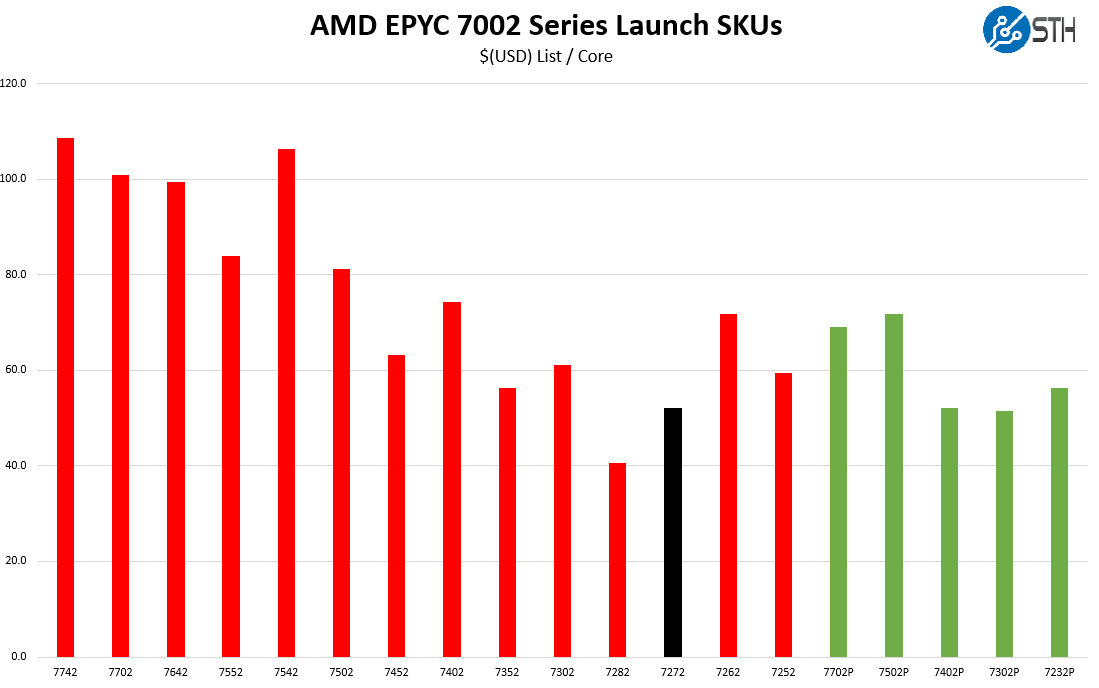
This is one of the lowest cost per core chips out there. Indeed, it is on-part with the AMD EPYC 7402P and AMD EPYC 7302P parts. Only the EPYC 7282 beats this chip in a cost per core metric.
When we pivot and focus on dual-socket capable parts, also adjusting for clock speeds we see that this is one of the best hardware values out there:
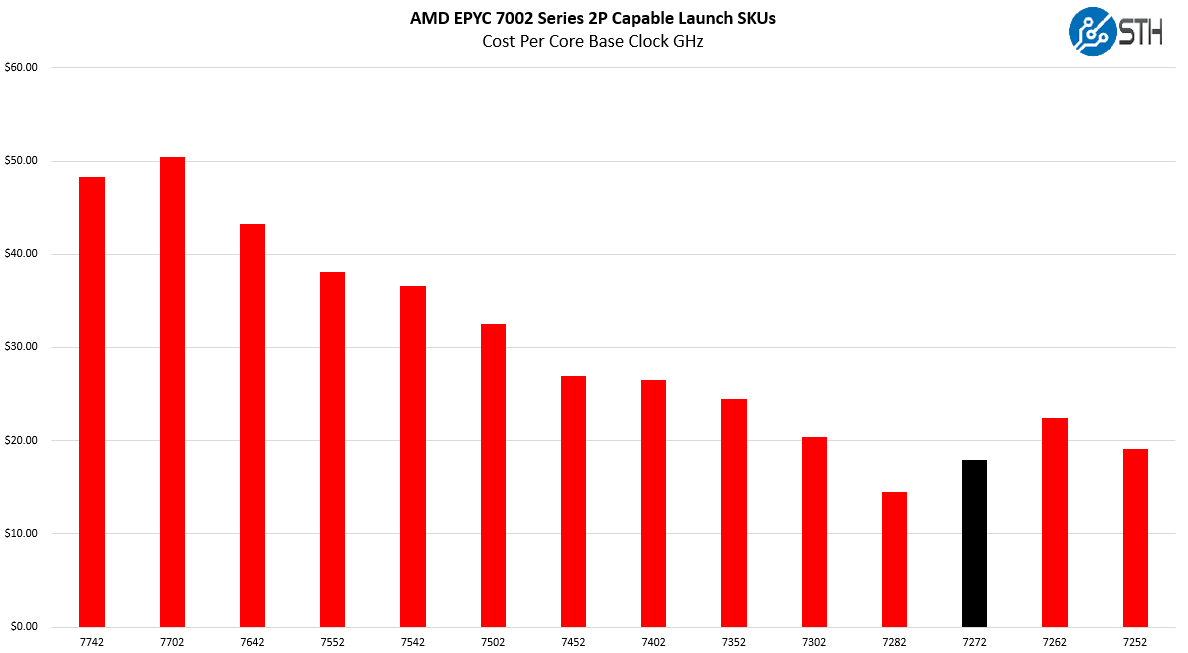
AMD is pricing-in some of the 4-channel memory optimizations in here. At the same time, if your goal is to get a lower cost and lower power chip in an EPYC platform, the EPYC 7272 can offer a compelling option.
AMD EPYC 7272 v. Intel Xeon Alternatives
Against the Intel competition, the AMD EPYC 7272 offers a different value proposition than we see in other CPU segments. Here AMD is offering a competitive product at a competitive price. To illustrate this, we can look at the AMD and 2nd Generation Intel Xeon Scalable pricing per core:
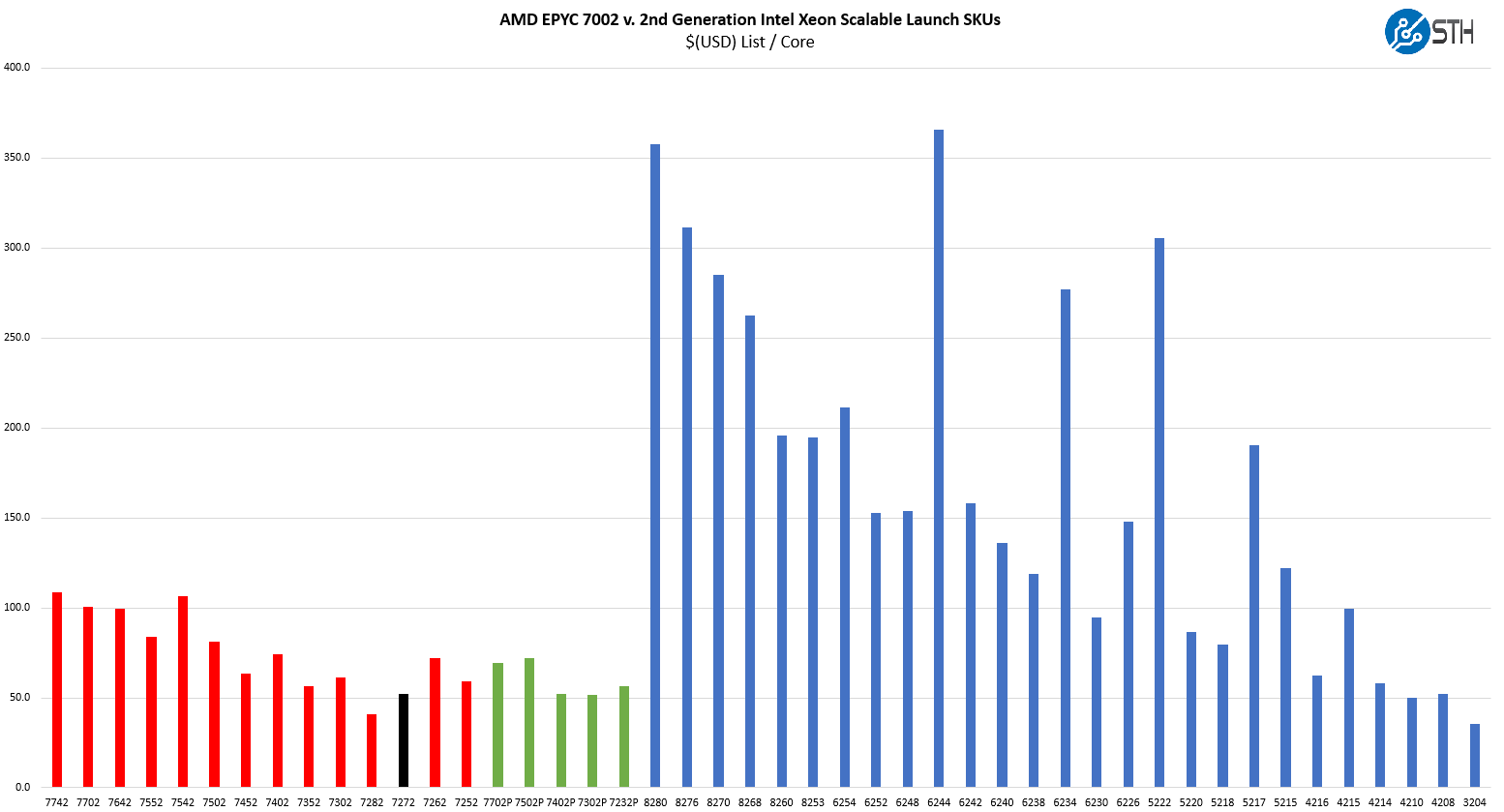
As you can see from this chart, AMD is effectively offering a chip here at a relatively similar price/ core as Intel Xeon Silver CPUs. That is important because then the CPU must compete on other merits in a market that can be hyper-focused on costs.
The AMD EPYC 7272 has more PCIe lanes and offers PCIe Gen4 instead of Intel with fewer older Gen3 lanes. It also offers CPU performance closer to a mid-range Xeon Gold 5200 series part versus the Intel Xeon Silver 4200 part.
At this end of the Intel Xeon stack, Optane DCPMM is not supported which is one of Intel’s major differentiation points. If you want larger or persistent DIMMs, you need to move up Intel’s stack to Xeon Gold.
Perhaps the biggest challenge in this segment is that when buyers spec a model of server with the intent to vary configuration for specific use cases, AMD does not have the $200-250 part to compete with the Intel Xeon Bronze 3204. While one can rightly argue that this chip has more expandability and generally better performance than its direct Intel price competition, there are many buyers who need a deeper stack at the lower-end of the segment. Still, for those that can take advantage of the EPYC 7272, it offers more performance than Intel at this price range.
Final Words
This is the lone 12-core part that is publicly available in the AMD EPYC 7002 “Rome” series. As such, it is an interesting data point for us. There is no “P” series single-socket part just like we see at the 48 core level. AMD is effectively competing in the mid-Xeon Gold 5200 range with a part that is priced at the level of a Xeon Silver 4200. AMD also has expandability that current-generation Intel Xeons do not match.
Perhaps the toughest challenge for the EPYC 7272 is its neighbors in the SKU stack. For cost-optimized platforms that do not need more performance, AMD has lower-priced 8 core SKUs. If one is concerned about performance in these cost-optimized single-socket platforms, the AMD EPYC 7302P is only $200 while offering more cores and performance. Likewise, the EPYC 7282 is so close in price that many will choose that for dual-socket platforms over the EPYC 7272 because the incremental price to get an additional 33% more cores is negligible.

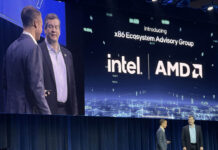
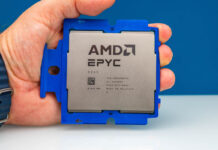
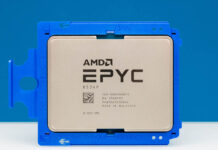
Seem like the 7282 is a way better deal than the 7272. 4 more cores, same TDP, relatively cheaper (7272 – $$693.76 on NewEgg, 7282 – $715.99 on NewEgg).
Will C – Our 1P 7282 testing is complete. That should be the next EPYC “Rome” piece in the pipeline.
Patrick, thanks for the hard work. Looking forward to it.
You need to add some thread limited benchmark to your test suite. Far from all workloads scale well over two digit number of threads. On the other hand, single core performance is not very useful either for server applications. I would say a 4 thread benchmark would give us very useful information.
Many of us are asking the question if EPYC will beat Intel for applications bottlenecked to a handful cores single thread throughput.
If none of your benchmarks show that EPYC 7762, which is the high frequency optimized 155W part, beats the 120W EPYC 7272 for anything, there is something wrong with the benchmark suite.